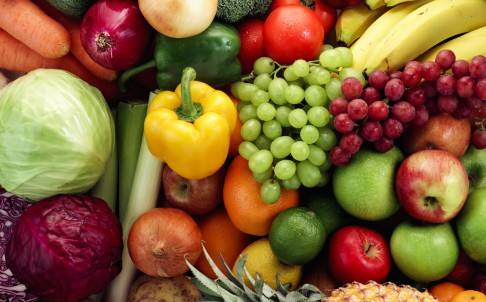Seven-a-day diet of fruit and veg helps you live longer, says study
Researchers find eating more fruit and vegetable significantly lowers risk of death at any age from cancer, heart disease and stroke
PUBLISHED : Tuesday, 01 April, 2014, 7:48pm
UPDATED : Tuesday, 01 April, 2014, 7:53pm
Staff reporter

A daily diet of at least seven portions of fresh fruit and vegetables will cut by 42 per cent the risk of death. Photo: Corbis
Eating seven or more portions of fresh fruit and vegetables a day will reduce the risk of dying at any age from cancer, heart disease and stroke, says a new study.
Researchers at University College London found that a daily diet of at least seven portions of fresh fruit and vegetables is linked to a 42 per cent reduced risk of death from all causes. These levels of fruit and vegetables are also associated with a 25 per cent lower risk of dying from cancer and 31 per cent reduced risk of dying from heart disease or a stroke.
The study also found that vegetables have much higher health benefits than fruit – and there was no sign of significant benefit from fruit juice. Also, surprisingly, canned and frozen fruit appeared to increase the risk of death by 17 per cent per portion.
“The clear message is that the more fruit and vegetables you eat, the less likely you are to die at any age”
Dr Oyinlola Oyebode
“We all know that eating fruit and vegetables is healthy, but the size of the effect is staggering,” says Dr Oyinlola Oyebode, of UCL’s department of epidemiology and public health, who was the lead author of the study.
“The clear message here is that the more fruit and vegetables you eat, the less likely you are to die at any age. Vegetables have a larger effect than fruit, but fruit still makes a real difference. If you’re happy to snack on carrots or other vegetables, then that is a great choice, but if you fancy something sweeter, a banana or any fruit will also do you good.”
The researchers at UCL carried out the study of the eating habits of 65,226 people in England, recorded in a Health Survey for England poll, between 2001 and last year, and checked them with their causes of death.
The study, published in the Journal of Epidemiology & Community Health, found that fresh vegetables had the strongest protective effect, with each daily portion reducing overall risk of death by 16 per cent.
Eating salad contributed to a 13 per cent risk reduction per portion, and each portion of fresh fruit was associated with a smaller but still significant 4 per cent reduction.
This is first time a nationally representative study – linked to eating fruit and vegetables – has looked at deaths from all causes, including cancer and heart disease, and the first to quantify health benefits per-portion, and identify the types of fruit and vegetable with the most benefits.
The World Health Organisation, which, since 1990, has recommended eating at least 400 grams of fruit and vegetables each day, warns that about 1.7 million (or 2.8 per cent) of all deaths worldwide are caused by low fruit and vegetable consumption. It says low fruit and vegetable intake is among the top 10 selected risk factors for global mortality.
WHO says worldwide, insufficient intake of fruit and vegetables is estimated to cause about 14 per cent of gastrointestinal cancer deaths, about 11 per cent of deaths from heart disease and about 9 per cent of stroke deaths.
The UCL study shows that, compared with eating less than one portion of fruit and vegetables, the risk of death by any cause is reduced by 14 per cent by eating one to three portions, 29 per cent for three to five portions, 36 per cent for five to seven portions and 42 per cent for seven or more.
Its findings support the Australian government’s “Go for 2 & 5” guidelines, which recommend eating a total of 675 grams a day – two 150 gram portions of fruit and five 75 gram portions of vegetables.
In Europe, Britain’s Department of Health, recommends people adopt “5 a day” approach, while the United States’ campaign tells people that “Fruit and Veggies – More Matters”.
“Our study shows that people following Australia’s ‘Go for 2 & 5’ advice will reap huge health benefits,” Oyebode says. “However, people shouldn’t feel daunted by a big target like seven. Whatever your starting point, it is always worth eating more fruit and vegetables. In our study even those eating one to three portions had a significantly lower risk than those eating less than one.”
Researchers found that people who ate canned or frozen fruit actually had a higher risk of heart disease, strokes and cancer. Oyebode and her colleagues said they were not sure how to explain these results.
“Most canned fruit contains high sugar levels and cheaper varieties are packed in syrup rather than fruit juice,” Oyebode says. “The negative health impacts of the sugar may well outweigh any benefits. Another possibility is that there are confounding factors that we could not control for, such as poor access to fresh groceries among people who have pre-existing health conditions, hectic lifestyles or who live in deprived areas.”
Oyebode and colleagues took into account the socio-economic background, smoking habits and other lifestyle factors that affect people’s health. They said they had found a strong link between high levels of fruit and vegetable consumption and lower premature death rates – not a causal relationship.
The strength of the study is in the large number of people surveyed, and the fact that the data was collected from a random selection of people in the "rea"l world, rather than participants that had certain health conditions or lifestyles.
